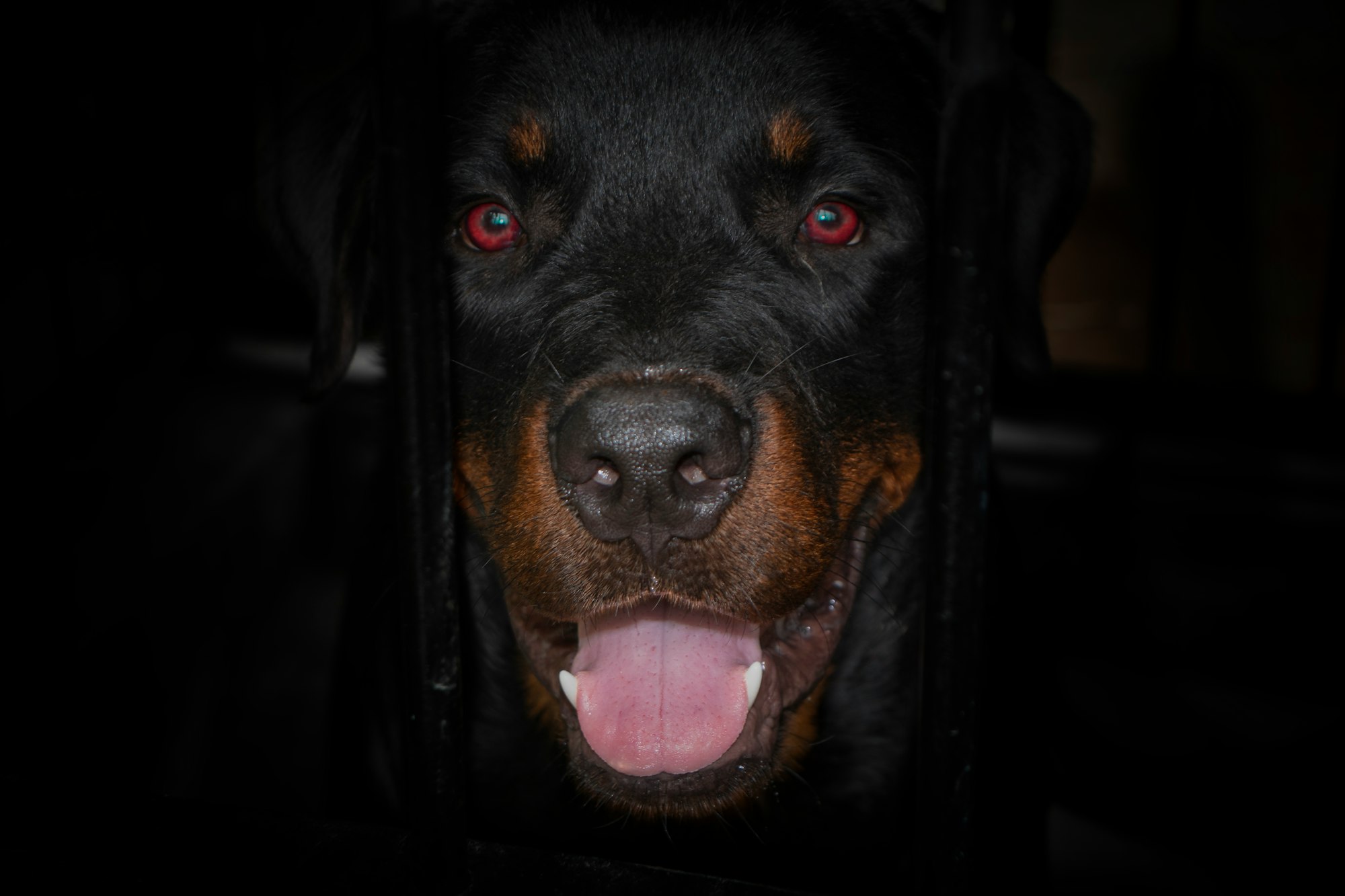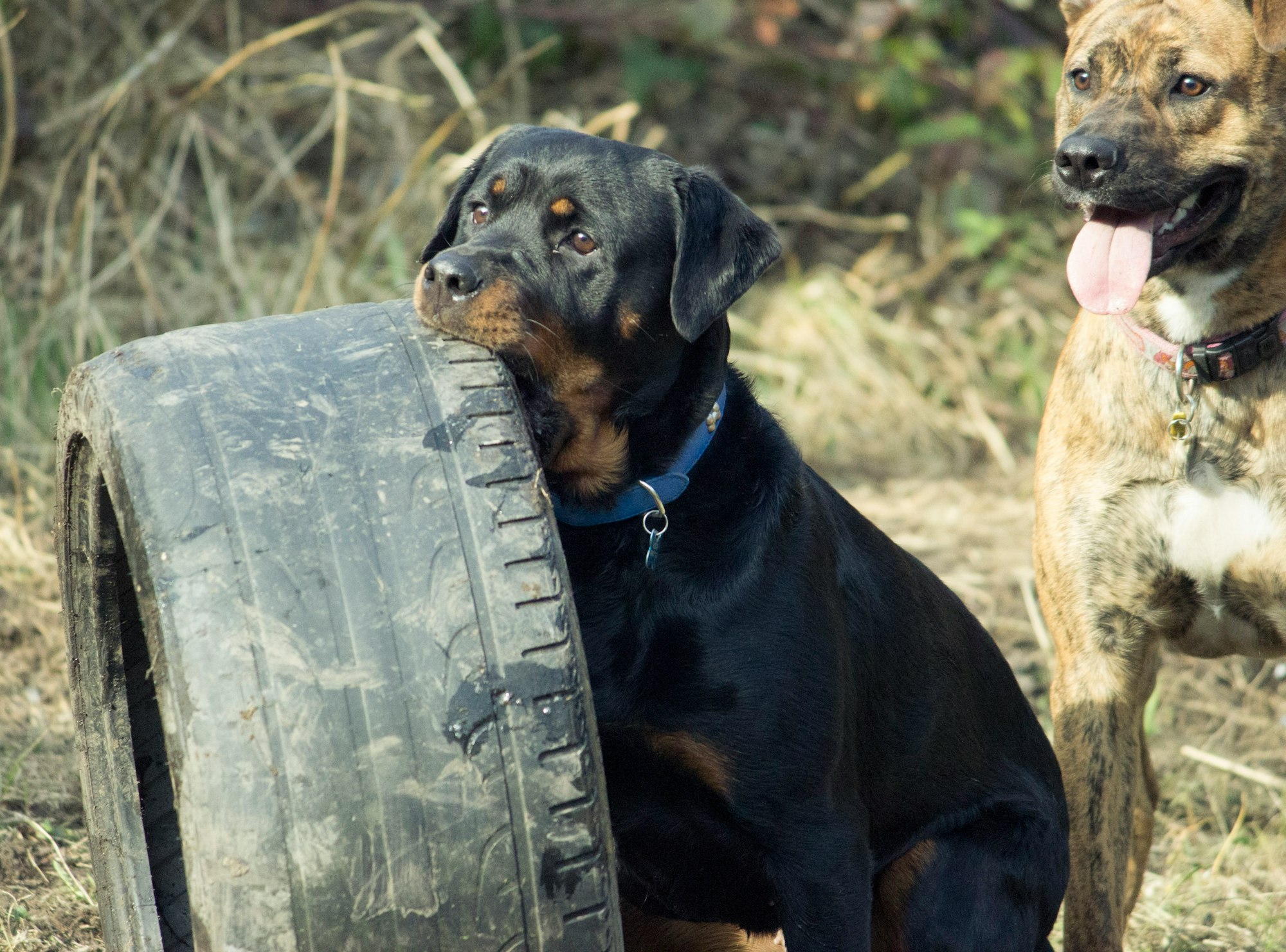Introducing the majestic Rottweiler: a breed that boasts a unique blend of strength, intelligence, and devotion. These loyal canine companions have earned their place in the hearts and homes of dog lovers around the world. As Rottie enthusiasts, we understand the desire to ensure our cherished companions are with us for as long as possible.
In this article, we delve into the world of Rottweiler lifespan, unveiling the factors that contribute to their longevity and what we, as responsible pet owners, can do to promote a healthy and fulfilling life for our four-legged friends. Join us as we embark on a journey to unlock the secrets of a Rottweiler's life, filled with affectionate head tilts, endearing expressions, and a steadfast commitment to their human family.
How Long Do Rottweilers Live?
On average, Rottweilers live for around 8-10 years. However, the lifespan of a Rottweiler can vary depending on various factors such as genetics, diet, exercise, and healthcare. Some Rottweilers may live longer than 10 years, while others may have a shorter lifespan.
It is essential to provide proper care and attention to your Rottweiler to ensure that they live a long and healthy life. Regular visits to the vet, a healthy diet, regular exercise, and love and attention from their owner can all contribute to a longer lifespan for Rottweilers.

The Average Rottweiler Life Cycle
The life cycle of a Rottweiler can be divided into four stages:
Puppyhood (0-1 year): During this stage, Rottweiler puppies grow and develop quickly. They require a lot of care and attention, including proper nutrition, socialization, and training.
Adolescence (1-3 years): This stage is characterized by continued growth and development. Rottweilers may become more independent and stubborn during this stage, making training and socialization even more critical.
Adulthood (3-8 years): Rottweilers reach their physical and mental maturity during this stage. They are typically at their strongest and healthiest during this time.
Senior years (8+ years): As Rottweilers age, they may experience health issues such as arthritis, cancer, or other age-related conditions. It is important to provide senior Rottweilers with proper nutrition, exercise, and veterinary care to keep them comfortable and healthy.
It is important to note that the lifespan and life cycle of a Rottweiler can vary depending on various factors, including genetics, environment, and healthcare. Providing your Rottweiler with proper care and attention can help ensure a long and healthy life.
Rottweiler Puppies
The puppy stage of a Rottweiler's life typically lasts from birth to about 1 year of age. During this stage, Rottweiler puppies are rapidly growing and developing, both physically and mentally. They require a lot of care, attention, and socialization to ensure that they develop into well-behaved and well-adjusted adult dogs.
At birth, Rottweiler puppies are blind, deaf, and helpless. They rely completely on their mother for food, warmth, and protection. During the first few weeks of life, their eyes and ears open, and they begin to explore their surroundings.
Around 6-8 weeks of age, Rottweiler puppies are ready to be separated from their mother and littermates and go to their new homes. At this point, they are still very young and vulnerable and require a lot of attention and care from their new owners.

During the puppy stage, Rottweilers should be socialized with other dogs, people, and different environments to prevent them from becoming shy or fearful as adults. They also require plenty of exercise and playtime to help them burn off energy and develop their physical and mental abilities.
Adolescent Stage
The adolescent stage of a Rottweiler's life typically lasts from around 1 to 3 years of age. During this stage, Rottweilers are still growing and developing, but they are becoming more independent and assertive. This can make them more challenging to train and manage.
As Rottweilers reach adolescence, they may start to test their boundaries and challenge their owners' authority. They may become more stubborn, less obedient, and more prone to misbehaving. It is essential to maintain consistency in training and discipline during this stage to prevent bad habits from forming.
Rottweilers at this stage require plenty of exercise and mental stimulation to keep them from becoming bored or destructive. They are highly energetic and require plenty of opportunities to burn off their excess energy. This can include activities such as running, playing fetch, or participating in obedience or agility training.
Socialization is also crucial during the adolescent stage. Rottweilers should continue to be exposed to different people, animals, and environments to help them become well-adjusted and well-behaved adult dogs. Positive reinforcement training is highly effective during this stage, as it helps to build a strong bond between the owner and the dog.
Rottwelier Adult
The adulthood stage of a Rottweiler's life typically lasts from around 3 to 8 years of age. During this stage, Rottweilers have reached their physical and mental maturity, and they are at their strongest and healthiest.
Adult Rottweilers are typically less energetic and less mischievous than they were during their adolescent stage. They are usually more obedient and easier to train, and they have a greater capacity for self-control.

While Rottweilers in adulthood may not require as much exercise as they did during their younger years, they still require plenty of physical activity to maintain their health and well-being. They benefit from regular walks, runs, and playtime, as well as activities such as obedience training, agility, or even weight-pulling.
Nutrition and veterinary care remain essential during the adulthood stage. Rottweilers should continue to receive regular check-ups and vaccinations to maintain their health and prevent the onset of age-related illnesses. Their diet should be appropriate for their age and activity level, with a focus on high-quality protein and nutrient-dense ingredients.
Senior Rottweiler
The senior stage of a Rottweiler's life typically begins around 8 years of age or older. During this stage, Rottweilers may start to experience health issues and a decline in physical and mental function.
As Rottweilers age, they may become less active and require less exercise. However, it is still important to provide them with regular walks and low-impact exercise to maintain their health and mobility. It is also essential to monitor their weight and diet to ensure they maintain a healthy weight.
Senior Rottweilers may experience age-related health issues such as arthritis, hip dysplasia, or vision and hearing loss. They may also be more susceptible to cancer, kidney disease, or heart problems. Regular veterinary check-ups are essential to monitor their health and catch any issues early.
During the senior stage, it is important to provide Rottweilers with a comfortable and safe living environment. They may require special accommodations such as softer bedding, ramps or steps, or raised feeding bowls to make their daily life more comfortable.
How To Extend The Life Of Your Rottweiler
There are several things you can do to extend the life of your Rottweiler and ensure they live a long and healthy life:
Provide a healthy diet: Feeding your Rottweiler a healthy, balanced diet that is appropriate for their age, activity level, and health status is essential. This will help ensure they receive all the nutrients they need to maintain their health and prevent illness.
Regular exercise: Regular exercise is essential for keeping your Rottweiler physically fit and mentally stimulated. This can include activities such as walking, running, playing fetch, or participating in obedience or agility training.
Regular veterinary care: Regular check-ups with a veterinarian can help detect health problems early and prevent more serious issues from developing. This includes annual wellness exams, vaccinations, dental cleanings, and parasite prevention.
Socialization: Proper socialization with people and other animals can help prevent behavior problems and ensure your Rottweiler is well-adjusted and well-behaved.
Positive reinforcement training: Positive reinforcement training can help build a strong bond between you and your Rottweiler and encourage good behavior. This training approach involves rewarding good behavior with treats or praise rather than punishment for bad behavior.
Maintain a healthy weight: Maintaining a healthy weight can help prevent obesity-related health problems and extend your Rottweiler's lifespan. This can be achieved through a balanced diet and regular exercise.
Provide a safe and comfortable living environment: Providing a safe and comfortable living environment for your Rottweiler can help prevent injuries and ensure they feel secure and happy in their home.

Why Do Rottweilers Have a Short Lifespan?
While Rottweilers are known for their strength and endurance, they unfortunately have a shorter lifespan than some other breeds. There are several reasons why this may be the case, including diet, exercise, and more.
Diet of the Rottweiler
Diet is an essential factor that can impact a Rottweiler's lifespan. Rottweilers require a diet that is rich in protein and nutrients to maintain their muscle mass and overall health. However, feeding them an inappropriate or low-quality diet can lead to health problems such as obesity, heart disease, and other illnesses, which can shorten their lifespan.
Exercise for your Rottweiler
Exercise is also crucial for Rottweilers. These dogs are highly energetic and require plenty of physical activity to maintain their health and well-being. Regular exercise can help prevent obesity and other health problems, which can extend their lifespan. On the other hand, lack of exercise can lead to weight gain, decreased mobility, and a shorter lifespan.
Sterilization of the Rottweiler
There are several benefits to sterilization for Rottweilers, including:
Reduced risk of certain health problems: Sterilization can help reduce the risk of certain health problems, such as uterine infections and certain types of cancer.
Preventing unwanted litters: Sterilization can prevent unwanted litters of puppies, which can help reduce the number of homeless dogs in shelters.
Reducing aggression: Sterilization can reduce aggressive behavior in male Rottweilers, making them less likely to fight with other dogs or exhibit dominance behavior.
Improved behavior: Sterilization can also improve behavior in Rottweilers, making them less likely to roam or mark their territory inside the house.
However, there are also potential drawbacks to sterilization, including:
Surgical risks: Like any surgery, sterilization carries some risk of complications, such as infection or bleeding.
Weight gain: Sterilized Rottweilers may be more prone to weight gain, which can lead to obesity and other health problems.
Long-term effects: Sterilization can have long-term effects on a Rottweiler's health and behavior, and it is important to consider the potential consequences before deciding to proceed with the surgery.
Ultimately, the decision to sterilize a Rottweiler is a personal one that should be made in consultation with a veterinarian. Sterilization can have both benefits and drawbacks, and it is important to weigh these carefully before making a decision.
In-Breeding of the Rottweiler
Inbreeding is the mating of closely related individuals, such as siblings or parent-offspring pairs. Inbreeding is a common practice in many dog breeds, including Rottweilers, and it is often used to maintain specific traits or characteristics within a breed.
While inbreeding can help produce desired physical and behavioral traits in Rottweilers, it can also lead to health problems and reduced genetic diversity. When closely related dogs are mated, it increases the likelihood of inheriting genetic defects or predispositions to certain health problems, such as hip dysplasia, heart disease, or certain types of cancer.
Inbreeding can also lead to reduced genetic diversity within a breed, which can make the breed more vulnerable to the effects of genetic disorders and other health problems. Over time, this can lead to a decline in the overall health and well-being of the breed.
To mitigate the risks associated with inbreeding, responsible breeders carefully screen their dogs for genetic disorders before breeding them. They also use a variety of breeding strategies, such as outcrossing (breeding two unrelated individuals) or linebreeding (breeding individuals with a common ancestor several generations back), to help maintain genetic diversity while still preserving desirable traits.

Final Thoughts
Rottweilers are loyal and loving companions that make excellent family pets. However, they require proper care and attention to ensure that they live a long and healthy life. Providing a healthy diet, regular exercise, socialization, and veterinary care can all contribute to extending your Rottweiler's lifespan.
It is also important to be aware of potential health issues and to work with a reputable breeder who prioritizes the health and well-being of their dogs. Responsible breeding practices, such as genetic testing and avoiding inbreeding, can help reduce the risk of health problems in Rottweilers.
Ultimately, with proper care and attention, Rottweilers can make wonderful companions and provide years of love and companionship to their owners.
Get more expert advice on pet-parenting by visiting the Off Leash blog at TryFi.com.
TryFi's The Fi Dog Collar is a must-have for any pet parent, it's a GPS tracking collar that helps you keep tabs on your dog's location, activity, and sleep patterns, and alerts you if they escape your backyard. Try the Fi Dog Collar today!

